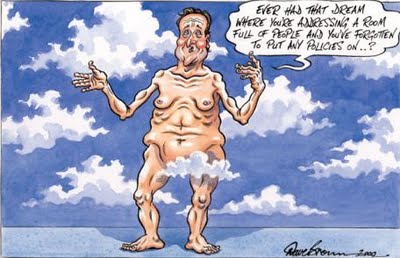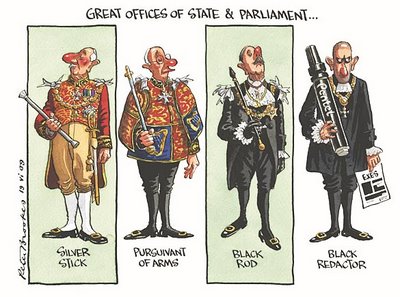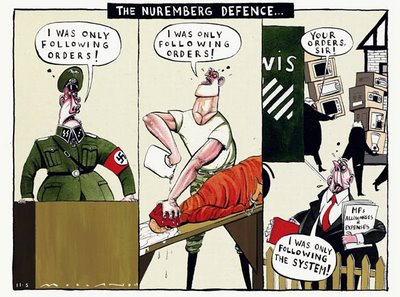The Tory education class war.
Back here in the real world, when you can put a cigarette paper between Labour and the Conservatives, it's invariably the Tories that have the more stomach-turning ideas, as well as those which are simply wrong-headed, or indeed those that are openly reactionary, somewhat strange for a party that claims to now espouse liberal conservatism, whatever that is. Hence we have the pledge to openly redistribute from the single, engaged and everyone else to the married, those who are truly the most in need. Or as today's launch of the party's education policies showed, somehow managing to be even worse than Labour at reforming our benighted education system.
After all, it really ought to be an open goal. Even after almost 13 years under New Labour, still barely 50% manage to get 5 "good GCSEs", a record so appalling that it can't be stressed often enough. There have been improvements made, although considering the amount of money pumped in it would be incredible if there hadn't been, and diplomas as introduced by Ed Balls with the mixture of vocational and academic work contained within is one of the few reforms which has been a step in the right direction, but on the whole Labour has been too focused on the league tables, the incessant examination of students and the continued reforming of schools purely it's seemed at times for the sake of it, with academies being the obvious example, which in equal measure have failed to raise standards while at the same time imposing the kind of discipline and rigidity which seems to actively sexually arouse certain individuals pining for the corporal punishment and being seen and not heard of their own childhood. Oh, and the lessons in working in call-centres, the kind of aspirational teaching that the Conservatives seemingly want to build on.
When Cameron then immediately decides that the most important thing which will decide whether or not a child succeeds is not their background, the curricula, the type of school or the amount of funding it receives but the person who teaches them, he's on the verge of talking nonsense on stilts, with Chris linking to some research which is in disagreement with that which Cameron quotes. Ignore that for a second though, and just consider Cameron's thought process: because the teacher is so important, only the very finest should be funded. How are we judging whether the teacher will be any good or not? On the basis of err, the university which they received their degree from and on the grade on the paper they received at their graduation. Surely if the type of school isn't important from the start, it also shouldn't matter which university the degree came from? Obviously not.
For a party which has been crying about Labour's piss-poor supposed class war, the thinking behind the proposed education policy is openly elitist, and also openly discriminatory in favour of the middle and upper classes: when only the top 20 colleges are likely to be considered good enough for those applying for the funding scheme and for their student loan to be paid off, colleges which are overwhelmingly populated by former private school students and which most state school applicants are actively discouraged from applying to for that very reason, this is the Tories' very own class war, their prejudices writ large in the same way as they claim Labour's to be. Even then it's contradictory: only a few months back Michael Gove wanted ex-service personnel to be fast-tracked into schools; now only the "best professionals with the best qualifications" need apply.
Others have pointed out that there is no correlation between the degree you get and the ability you have to teach. In fact, as Chris again suggests, the most academically gifted can potentially make things worse for those with lesser ability. I'd go as far to suggest that there are three groups of teachers out there: those that know what they're doing, those that can connect with those they're teaching, and that far rarer group, those that can do both. The exam results you get in your early twenties are no indication of how good you'll be at either of those things.
Not that the contradictions stop there: on discipline the Tories want to hand all the power over to the teachers themselves, ensuring that they can't be overruled by independent panels on exclusions, while at the same time wanting to ensure that schools can be held to account. Except on the former presumably? Alongside this, we have all the usual promises on cutting bureaucracy, on defeating waste, empowering everyone and all, as is likely, under the constraints imposed by cutting the deficit. Missing, as always, is the realisation that the number one thing parents want is a good local school which they can just send their offspring to in the knowledge that they will receive a good education, not the option to set-up a new one if it isn't good enough or they decide it isn't good enough. This however simply won't float when you can instead introduce your own pet projects, or prove to the newspapers that you're going to do something through even further shake-ups. Just letting the current system settle isn't an option when you've got to put your own imprint onto it, and if anything is likely to make things worse, Cameron's prescription is likely to be it.
Labels: David Cameron, education, Michael Gove, policy, politics, the new Tories








